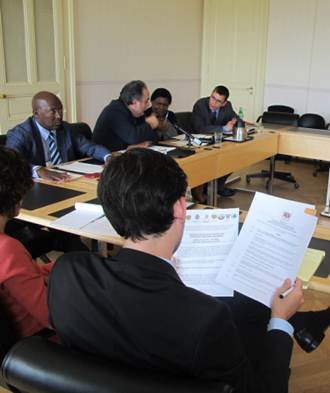The roundtable provided an opportunity for taking stock of current experiences of human rights defenders (HRDs), governments and international and regional organizations about how national mechanisms for the protection of HRDs work.
The event was attended by officials from several European and Latin American Permanent Missions to the United Nations Office at Geneva, regional organizations, including the Office for Democratic Institutions and Human Rights (ODIHR), the Organisation for Security and Cooperation in Europe (OSCE), the Office of the Commissioner for Human Rights of the Council of Europe, the African Commission on Human and People’s Rights (ACHPR), the International Coordinating Committee of NHRIs (ICC), as well as human rights non-governmental organizations.
Protection mechanisms have been implemented initially in some Latin American countries, including Colombia –with the oldest and largest public policy of the kind, Brazil, Guatemala, Mexico, and Honduras –where discussions between civil society and government have recently started.
National protection initiatives have equally begun to emerge in other regions. Both the Democratic Republic of Congo and South Sudan are the first African countries where HRDs are discussing laws and public policies specifically aiming for the protection of HRDs . Equally in Asia civil society organizations and HRDs of Nepal and Indonesia have been advocating –albeit less successfully so far– for the adoption of national protection laws. However strikingly, nothing of the kind has yet been attempted by those countries in the European continent and Central Asia where the protection of HRDs is problematic.
Protection International has been encouraged not only by the positive response from governments and international, regional and non-governmental organisations, but also by the lively discussions among participants. The debate allowed to cast some light on the challenges lying ahead to ensure protection on HRDs. Experience shows that effective protection mechanisms encompass pieces of legislation as well as adequate technical tools for systematically assessing risks and threats; moreover, HRDs’ protection has to be adapted to the specific needs of the defenders. Both issues require the active involvement of civil society in the setting up of the mechanisms. The involvement of national human rights institutions as a channel between civil society and government needs to be explored further. Finally, national mechanisms will only be window-dressing if authorities do not fight forcefully against impunity regarding crimes against defenders.
Protection International hopes that the roundtable in Geneva will spark the interest of governments, regional and international organisations on the creation of national mechanisms for the protection of HRDs while fostering collaboration among defenders, duty-bearers and key stakeholders for the establishment of more effective and efficient tools for the protection of HRDs on the ground.


